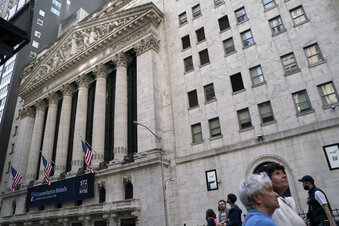Wall Street, global markets fall in wake of bond sell-off
3 min read
Pedestrians pass the New York Stock Exchange, May 5, 2022, in the Manhattan borough of New York. Stocks are off to a higher start on Wall Street Monday, June 6, 2022 led by more gains in big tech companies. The S&P 500 was up 0.8%. The benchmark index is coming off its eighth losing week in the last nine. The Nasdaq rose 1.2% and the Dow rose 0.5%. (AP Photo/John Minchillo, file)
NEW YORK (AP) — Stocks Markets are falling at the open on Wall Street Tuesday as anxiety about a possible U.S. economic slowdown triggered by a bond sell-off Monday sent investors looking for shelter. The S&P 500 is down 0.8% and the Dow Jones Industrial Average is down 0.7%, while the technology-heavy Nasdaq composite is down 1.2%. Shares in retailer Target are plunging at the open after it said it was cancelling orders and slashing prices to clear out inventory, moves that will hurt its profits. Jam maker J.M. Smucker and restaurant-arcade chain Dave & Buster’s Entertainment jumped on solid quarterly earnings. Treasury yields rose slightly.
Wall Street markets is pointing to a lower open Tuesday after a bond sell-off fueled anxiety about a possible U.S. economic slowdown, as well as more potentially adverse news from a major retailer.
Futures for the Dow Jones Industrial Average fell 0.7% and futures for the S&P 500 dipped 0.8%. Global markets mostly declined.
The market price of a 10-year Treasury bond fell, increasing its yield, or the difference between the day’s price and the payout at maturity.
The difference between short- and long-term Treasury yields is narrowing, which makes economists nervous because it suggests investors think a U.S. recession is more likely, said Jeffrey Halley of Oanda in a report.
“I don’t think the U.S. is at stagflation yet,” or a period with high inflation and low growth, “but if oil stays above $120.00 a barrel, it might soon be,” Halley said.
Adding to the anxiety, shares of Target fell about 9% in premarket trading after the retailer said it was canceling orders from suppliers, particularly for home goods and clothing, to clear out amassed inventory ahead of the critical fall and holiday shopping seasons. The Minneapolis company said it would slash prices to clear its inventory. Target said the maneuvers would hurt its bottom line in the current quarter.
The actions come after a faster-than-expected spending shift by Americans as they move away from putting money into their homes to spend it instead on travel, dining and other activities that were riskier during the pandemic.
Markets are swinging between gains and losses as investors weigh evidence about whether the Federal Reserve’s interest rate hikes can cool inflation that is running at a four-decade high without tipping the U.S. economy into recession.
The yield on the 10-year Treasury, or the difference between the market price and the payout if held to maturity, jumped back above 3% to 3.03%, up from 2.95% late Friday.
The Treasury yield is moving toward its levels from early and mid-May. Then, it reached its highest point since 2018 amid expectations for the Federal Reserve to raise interest rates aggressively.
Bond buyers usually want a higher payout in exchange for tying up their money for longer periods. A flattening of the yield curve, or the long-term payout falling to match short-term bonds, is seen as an indicator of a possible recession because it shows investors expect economic conditions to be worse than they are now.
In midday trading, Frankfurt’s DAX fell 1.1% and the CAC in Paris tumbled 1%. The FTSE 100 in London dipped 0.2%.
In Asia, the Shanghai Composite Index lost less than 0.1% to 3,234.77 after Chinese authorities further eased anti-virus restrictions that shut down businesses in Shanghai and other major cities.
The Nikkei 225 in Tokyo gained 0.1% to 27,943.95 while the Hang Seng in Hong Kong shed 0.8% to 21,481.75.
Sydney’s S&P-ASX 200 sank 1.6% to 7,091.50 after the Australian central bank raised a key interest rate by 0.5 percentage points, its biggest margin in 22 years, to cool inflation that is at a two-decade high.
The Kospi in Seoul tumbled 1.6% to 2,628.88 and India’s Sensex fell 1.2% to 54,992.34. New Zealand and Singapore declined while Jakarta advanced.
The yen, trading at two-decade lows, fell to 132.87 to the dollar from Monday’s 132.01.
The yen has weakened because Japanese interest rates have stayed near record lows while U.S. and European rates rise. That helps Japanese exporters making their goods cheaper abroad but pushes up prices of imports for consumers and manufacturers.
The euro fell to $1.0662 from $1.0691.
Benchmark U.S. crude fell 35 cents to $118.15 per barrel in electronic trading on the New York Mercantile Exchange. The contract fell 37 cents on Monday to $118.50. Brent crude, the price basis for international oil trading, lost 44 cents to $119.07 per barrel in London. It lost fell 21 cents the previous session to $119.51.






